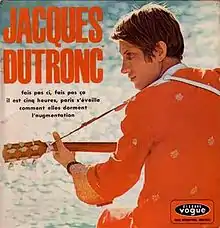Il est cinq heures, Paris s'éveille
"Il est cinq heures, Paris s'éveille" ("It is five o'clock, Paris awakens") is the sixth single by the French singer-songwriter Jacques Dutronc, released in 1968. It appears on his second album, Jacques Dutronc.
| "Il est cinq heures, Paris s'éveille" | ||||
|---|---|---|---|---|
 | ||||
| Single by Jacques Dutronc | ||||
| Released | March 1968 | |||
| Recorded | 1968 | |||
| Genre | French rock | |||
| Length | 2:55 | |||
| Label | Disques Vogue | |||
| Songwriter(s) | Jacques Lanzmann, Anne Ségalen, Jacques Dutronc | |||
| Producer(s) | Unknown | |||
| Jacques Dutronc singles chronology | ||||
| ||||
In 1991, it was voted best French-language single of all time in a poll of music critics.[1][2]
Composition

The song originated from an idea put forward by Jacques Wolfsohn, an artistic director at Disques Vogue, during a meal at his home with songwriting partners Jacques Dutronc and Jacques Lanzmann. He suggested a song on the subject of Paris in the morning. The other two Jacques began writing the song at around 11 pm that evening, and completed it at daybreak. It takes inspiration from "Tableau de Paris à cinq heures du matin", an 1802 song by Marc-Antoine Madeleine Désaugiers.[3]
The modernized lyrics replace Désaugiers' sunrise tableau of bakeries, fruitstands and street cleaners with a less soothing scene of trucks, cars and strippers.[3] Familiar Parisian landmarks such as the Place Dauphine are reexamined for the 1960s; the grand railway station Gare Montparnasse is described as "no more than a carcass" ("...n'est plus qu'une carcasse...") because, at the time the song was written, it was in the process of demolition to make way for the Tour Montparnasse skyscraper.[4]
The flute solo in the recording was added at the end of the session. Dutronc and Lanzmann were unhappy with the arrangement and felt that it lacked something. Dutronc had the idea of adding a manouche-style guitar part, but a flautist working elsewhere in the same building, Roger Bourdin, was asked to listen to the recording and agreed to improvise the short but evocative solos that appear after each sung line on the finished track.[1][3]
The lyrics to the song are co-credited to Lanzmann's wife at the time, Anne Ségalen.[5]
Release and promotion
"Il est cinq heures, Paris s'éveille" was released as a four-track EP in France in March 1968.
Dutronc performed the song on the Office de Radiodiffusion Télévision Française television shows Tilt magazine, broadcast on 27 March 1968, and Palmarès des chansons, broadcast on 18 April 1968.[6]
Reception and legacy
On 23 March 1968, "Il est cinq heures, Paris s'éveille" was Dutronc's third single to reach number one in the French charts, where it stayed for one week. It also reached number two in Belgium and number four in The Netherlands.[7]
Although the song was not intended to have any political significance, its refrain of "Paris s'éveille" ("Paris awakens") found an obvious resonance in the context of the events of May 1968, a few weeks after its release (the first campus occupation, at Paris X University Nanterre, began the day before the song reached number one). It has, therefore, been described as a "hymn" to those events.[3] A re-written version was mimeographed and sung at the barricades.[8] The song was withdrawn from the playlists of most radio stations and was quickly adapted by the protest singer Jacques Le Glou, with new verses depicting a city of overturned Peugeots and dead policemen.[9]
In 1991, "Il est cinq heures, Paris s'éveille" was voted the best French-language single of all time in a poll of music critics organised by Le Nouvel Observateur for a TV special broadcast on Antenne 2, beating Jacques Brel's "Ne me quitte pas" into second place.[1][2] Rock critic Thierry Coljon describes Dutronc's song as "one of the most beautiful there is".[10]
Cover versions
The song has been covered by Sylvie Vartan, Patrick Genet, Ange, Dominique Grange (Le Glou's version) and An Pierlé.[11]
Track listing
Words by Jacques Lanzmann and Anne Ségalen, music by Jacques Dutronc.
Side A
| No. | Title | Length |
|---|---|---|
| 1. | "Il est cinq heures, Paris s'éveille" | 02:55 |
| 2. | "L'augmentation" | 02:31 |
Side B
| No. | Title | Length |
|---|---|---|
| 1. | "Comment elles dorment" | 03:09 |
| 2. | "Fais pas ci, fais pas ça" | 01:40 |
References
- "Jacques DUTRONC vainqueur des 45 tours". Institut National de l'Audiovisuel.
- "Best title". Le Soir. 2 February 1991. p. 28.
- Monssens, Olivier (27 July 2004). "Succès en tubes : " Il est cinq heures, Paris s'éveille "". Le Soir (in French). p. 10.
- "La Tour Montparnasse fête ses 40 ans". Le Télégramme. 14 September 2013.
- "Jacques Dutronc biography". RFI Music.
- "Jacques Dutronc "Il est cinq heures Paris s'éveille"". Institut National de l'Audiovisuel.
- "Jacques Dutronc "Il est cinq heures Paris s'éveille"". Institut National de l'Audiovisuel. - "Hits of the World". Billboard. 27 April 1968. p. 53.
- "Hits of the World". Billboard. 15 June 1968. p. 60. - "Le travail en chansons - Il est cinq heures". La Cité des sciences et de l'industrie.
- Kitschke, Beate (2013). Music and Protest in 1968. Cambridge, UK: Cambridge University Press. p. 261.
- Le Glou, Jacques (1974). Pour en finir avec le travail. Paris: EPM. - Coljon, Thierry (30 December 1992). "Et moi, et moi, et moi". Le Soir. p. 31.
- "Sylvie Vartan official website". Sony Music.
- "Discographie". Ange official fanclub.
- "An Pierlé : " Ce n'est pas une musique pour les radios "". Evene.fr.
External links
- Video of Jacques Dutronc performing "Il est cinq heures, Paris s'éveille" on the French TV show Palmarès des chansons, April 1968.